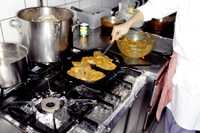Food Workers’ Reasons for Working When Sick
This page shows the study purpose, method, results, conclusions, and recommendations in plain language for the EHS-Net project titled Food Worker Experiences With and Beliefs about Working While Ill.
The findings and recommendations from this project are also in fact sheet format [PDF - 402 KB].
Citations for more EHS-Net publications are available by Study Topic or by Citation.

Study Problem
Sick food workers have been linked with past foodborne illness outbreaks.
The U.S. Food and Drug Administration (FDA) recommends that food workers not work when sick with symptoms of foodborne illness. We don’t know how often food workers follow this advice. If we learn more about what food workers do when they are sick, we can make recommendations to stop them from working when sick. Lowering the number of workers who work when they are sick can reduce the number of foodborne illness outbreaks.
Study Purpose
The purpose of this study is to describe
- What happened the last time the food workers in our study worked sick.
- Why they worked when they were sick.
- What affects their decisions to work when sick.
Study Findings in Brief
EHS-Net found that many food workers work when they are sick. They work when sick for many reasons, including personal, financial, and social reasons.
Study Method
State or local environmental health specialists interviewed 491 food workers in 391 restaurants. These restaurants were in the 2008 EHS-Net sites, and we chose them at random.
We asked food workers to remember a time when they had worked when sick. Then we asked them some questions about it. For example, we asked
- Who made the decision for them to work.
- Why they worked when sick.
- How certain factors affected their decisions to work when sick.
Study Results
What happened when workers worked sick
More than half (60%) of the workers could remember a time that they worked when sick.
- Some of these workers took steps to keep others from getting sick.
- One in five did not handle food.
- About one in three washed their hands more often.
- Almost all (89%) said it was their decision (not the manager’s) to work when sick.
- Four in ten said their manager did not know what their symptoms were.
Why workers worked when sick
The most common reasons workers gave for working when sick were
- The restaurant did not offer paid sick leave or have a sick leave policy.
- The restaurant was shorthanded and no one else could take their shift.
- They did not feel very sick or thought they would not pass their illness to anyone else.
- Their sense of duty or strong work ethic.
How certain factors affect workers’ decisions to work when sick
- Severity of symptoms, type of symptoms, and possibility of making other people sick [seven in ten workers].
- Dedication to their job and not wanting to leave coworkers short staffed [six in ten workers].
- Not getting paid [half of the workers].
- Fear of losing their job [one in four workers].
Study Conclusions
Many food workers work when they are sick. Not many of these workers take steps to keep others from getting sick. Steps they can take include washing their hands more often and not working with food.
In most cases, workers make the decision to work when sick. This does not follow the FDA recommendation that managers should decide whether sick workers should work.
Many managers did not know the sick workers’ symptoms. FDA recommends that managers base decisions about whether workers should work on the workers’ symptoms. Managers can’t do this if they don’t know those symptoms.
Workers work when sick for many reasons. They include personal, financial, and social reasons.
EHS-Net Recommends
Restaurant managers and food safety programs should work to better understand why sick workers work and prevent them from doing so. Efforts should focus on
- Involving kitchen managers in decisions about whether a sick worker should work.
- Addressing reasons workers give for working when they are sick.
- Understanding what factors affect workers’ decisions about working when sick.
Key Terms
- Environmental health specialists: public health workers who enforce health and safety standards related to food and other consumer products.
- Foodborne illness: an illness caused by germs in food.
- Foodborne illness outbreak: when two or more people have the same sickness after eating food from the same place.
- Page last reviewed: August 12, 2013
- Page last updated: August 16, 2016
- Content source:


 ShareCompartir
ShareCompartir